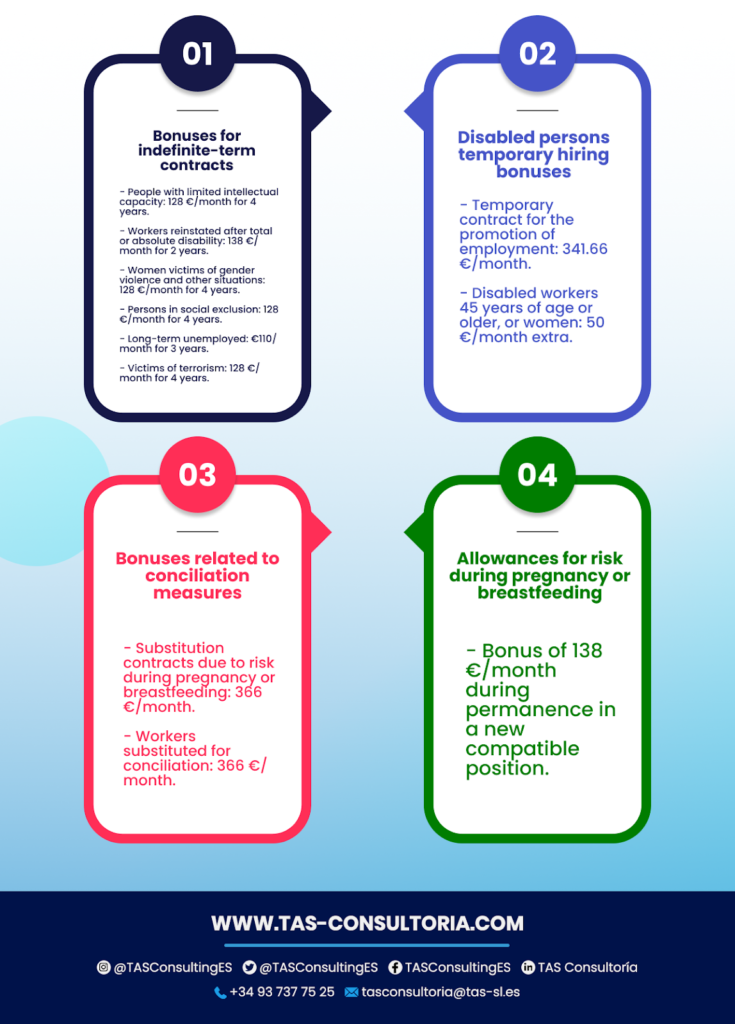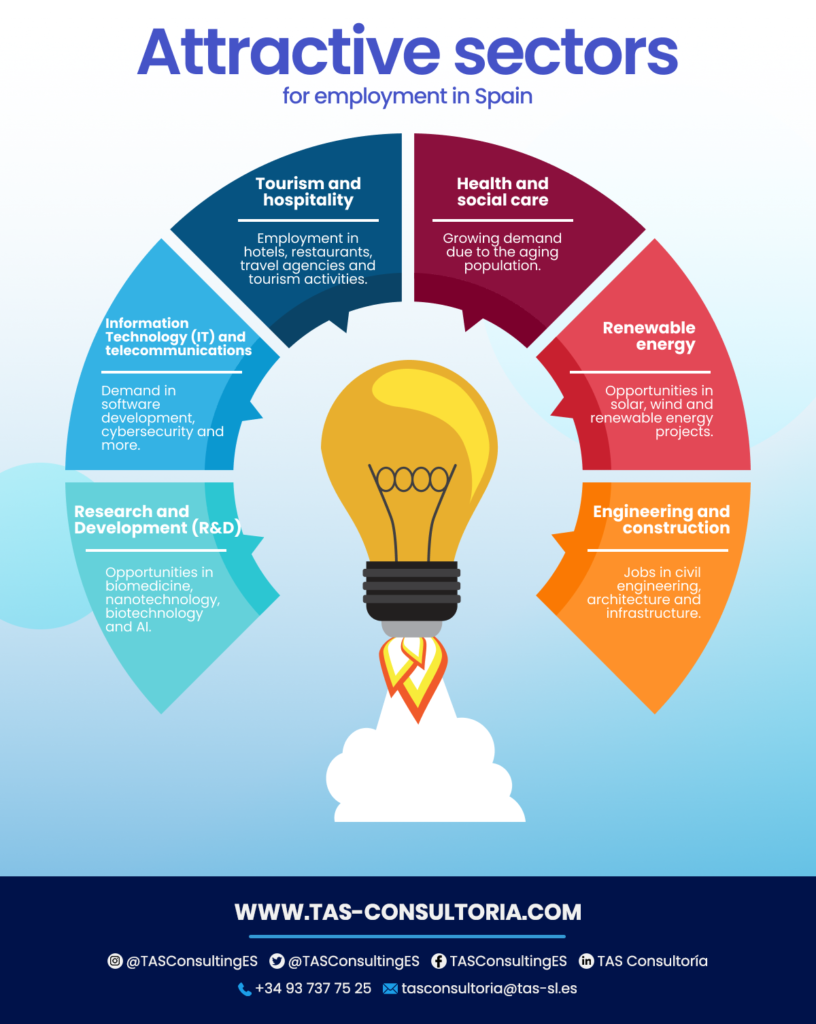
The labor market, the engine of the economy and social welfare, is a dynamic scenario that defines professional opportunities and careers. In Spain, understanding how this environment works is essential to chart your path to success. In this post, we will explore in depth the keys and dynamics of the Spanish labor market. Read on and discover the keys to excel and invest!
How does the labor market work?
The Spanish labor market operates through an employment system governed by a series of laws and regulations. Below, we share with you an overview of how it works and some reasons why it may be attractive:
Labor contracts and labor protection
In Spain, there are different types of employment contracts: temporary, indefinite-term, part-time, etc. These contracts define the working conditions, including salary, duration and associated benefits.
On the one hand, the labor system and labor market in Spain provides a series of rights and protections for workers. Such as minimum wages, paid vacations, severance payments, unemployment insurance, etc. These protections provide security and stability to workers.
On the other hand, the government establishes each year the minimum interprofessional wage. For those over 18 years of age, in 2023 it is 1,080 euros per month or 15,120 euros per year. With 12 monthly payments and two extras.
In Spain, salaries are quite competitive compared to other nearby countries. Most of the time, they are agreed in collective bargaining agreements.
Employment incentives
The Spanish government offers incentives in sectors such as research, development and technological innovation, tourism and the audiovisual sector. They also provide investment aid in certain regions, such as the Canary Islands. Depending on the performance of the labor market, various types of aid are available.
For example, innovative SMEs can access privileged financing from the Official Credit Institute (ICO). There you can have access to incentives for internationalization and aid from the European Union.
Active employment policies include guidance, training and counseling programs to boost job creation. This makes the labor market a dynamic space.
In addition, the General State Administration offers active employment policies and protection against unemployment. You can have access to bonuses on Social Security contributions to encourage stable or permanent hiring. You can see a table indicating the main types of bonuses:

Right to Social Security
In the Spanish labor market, there are several Social Security contribution regimes. In general, you must register and contribute to the Spanish Social Security System if you are:
- Entrepreneur
- Self-employed
- Cooperative worker
- Household employee
- Military
- Civil servant in Spain
- Or if you reside and work here. Unless you are in a specific temporary displacement situation.
There are also special situations within this regime for groups such as: artists, railway workers, trade representatives, bullfighting professionals, soccer players and other sportsmen, agricultural workers and household employees.
In addition, there are special regimes for seafarers, self-employed workers, civil servants, coal miners and students. The regime you belong to will depend on the labor market you are in, its nature and characteristics.
You may also be interested in: New labor reform in Spain 2021-2022
What is the work culture like in Spain?
Spain is located in a strategic position between Europe, Africa and Latin America. This makes it an attractive location for international companies. In that sense, employment opportunities in foreign and multinational companies are a large part of Spain’s labor market.
Lifestyle
Spain is known for its pleasant climate, cultural heritage, food and relaxed lifestyle. These factors make the country attractive to many people looking for a good quality of life.
Education and training
Spain has internationally recognized universities and training centers. This provides high quality education and training opportunities. In addition, the education system encourages language learning, which can be an advantage in a globalized job market.
If you are considering working in Spain, it is important to keep in mind that there are also challenges in the labor market. For example, high unemployment rates in certain areas and competition for skilled jobs.
However, many people find the job market in Spain attractive because of the career opportunities, job protections and lifestyle that the country offers.
You may also be interested in: Minimum Interprofessional Wage: Spain and the European Union
What are the most attractive sectors for employment opportunities?
Spain has a diverse economy with sectors such as tourism, manufacturing, agriculture, services, among others. This creates a wide range of job opportunities in different areas. We share with you the main ones:
Research and Development (R&D)
Spain is encouraging investment in research, development and innovation in various fields. The labor market includes biomedicine, nanotechnology, biotechnology and artificial intelligence. This generates opportunities for scientists, researchers and professionals in the field of technology.
Information technology (IT) and telecommunications
With the advancement of digital transformation, there is a growing demand for professionals in areas such as: software development, cybersecurity, artificial intelligence and data analytics.
Tourism and hospitality
Spain is one of the most popular tourist destinations in the world. This generates a great demand for employment in hotels, restaurants, travel agencies and related activities. It is the most booming job market.
Health and social care
The health and social care sector continues to grow. Especially due to the aging population and the increasing demand for health care services. Also due to the care of the elderly.
Renewable energies
Spain is experiencing significant growth in the renewable energy sector, especially solar and wind energy. It aims to reduce dependence on fossil fuels and, as a consequence, this has led to an increase in the labor market. Especially the demand for professionals in engineering and development of renewable projects.
Engineering and construction
As the economy recovers, investment in infrastructure and construction is expected to increase. This generates employment opportunities in areas such as civil engineering and architecture.
Read a summary of the key points:

You may also be interested in: Flexible compensation: definition and benefits
Now that you understand the complexities of the Spanish job market, you are one step closer to achieving your career goals. Stay on top of the latest trends and valuable information about the Spanish job market by subscribing to our library.
Don’t miss out on updates from the business and labor world! Subscribe now to receive exclusive content and stay one step ahead in your career path in Spain.




Your email address will not be published .
Required fields are marked with *